知识点回顾-时态练习
初中英语知识点归纳时态和语态回顾
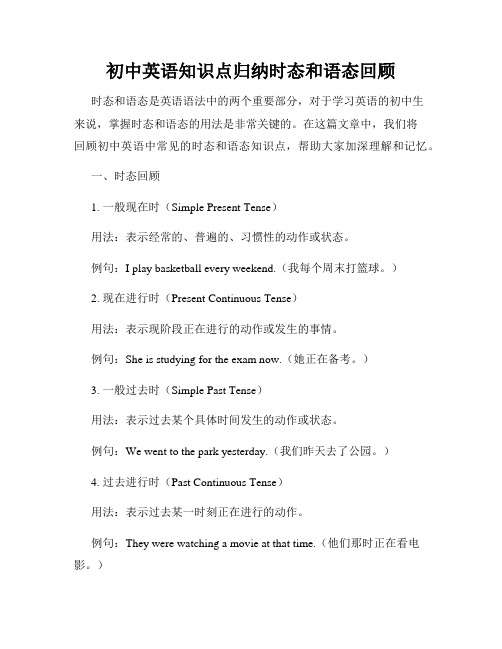
初中英语知识点归纳时态和语态回顾时态和语态是英语语法中的两个重要部分,对于学习英语的初中生来说,掌握时态和语态的用法是非常关键的。
在这篇文章中,我们将回顾初中英语中常见的时态和语态知识点,帮助大家加深理解和记忆。
一、时态回顾1. 一般现在时(Simple Present Tense)用法:表示经常的、普遍的、习惯性的动作或状态。
例句:I play basketball every weekend.(我每个周末打篮球。
)2. 现在进行时(Present Continuous Tense)用法:表示现阶段正在进行的动作或发生的事情。
例句:She is studying for the exam now.(她正在备考。
)3. 一般过去时(Simple Past Tense)用法:表示过去某个具体时间发生的动作或状态。
例句:We went to the park yesterday.(我们昨天去了公园。
)4. 过去进行时(Past Continuous Tense)用法:表示过去某一时刻正在进行的动作。
例句:They were watching a movie at that time.(他们那时正在看电影。
)5. 一般将来时(Simple Future Tense)用法:表示将来某个时间将要发生的动作或状态。
例句:I will visit my grandparents next week.(下周我会去看望我的祖父母。
)6. 将来进行时(Future Continuous Tense)用法:表示将来某一时刻正在进行的动作。
例句:They will be traveling to Beijing this time next month.(他们下个月这个时候将会在北京旅行。
)7. 现在完成时(Present Perfect Tense)用法:表示过去发生的动作对现在造成的影响或结果。
例句:He has already finished his homework.(他已经完成了作业。
四年级英语:动词时态与语态的转换知识点+练习
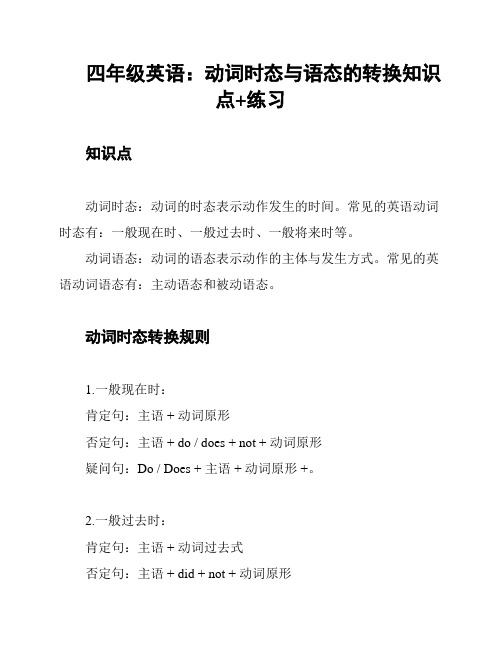
四年级英语:动词时态与语态的转换知识点+练习知识点动词时态:动词的时态表示动作发生的时间。
常见的英语动词时态有:一般现在时、一般过去时、一般将来时等。
动词语态:动词的语态表示动作的主体与发生方式。
常见的英语动词语态有:主动语态和被动语态。
动词时态转换规则1.一般现在时:肯定句:主语 + 动词原形否定句:主语 + do / does + not + 动词原形疑问句:Do / Does + 主语 + 动词原形 +。
2.一般过去时:肯定句:主语 + 动词过去式否定句:主语 + did + not + 动词原形疑问句:Did + 主语 + 动词原形 +。
3.一般将来时:肯定句:主语 + will + 动词原形否定句:主语 + will + not + 动词原形疑问句:Will + 主语 + 动词原形 +。
其他时态的转换规则可以参考相关教材。
动词语态转换规则1.主动语态:肯定句:主语 + 动词原形 / 动词时态否定句:主语 + do / does / did + not + 动词原形 / 动词时态疑问句:Do / Does / Did + 主语 + 动词原形 / 动词时态 +。
2.被动语态:肯定句:主语 + am / is / are / was / were + 过去分词否定句:主语 + am / is / are / was / were + not + 过去分词疑问句:Am / Is / Are / Was / Were + 主语 + 过去分词 +。
练题1.把下列句子改成一般现在时的否定句:I like apples。
-。
I do not like apples.___ to music。
-。
She does not listen to music.2.把下列句子改成一般过去时的疑问句:___。
-。
Did they play basketball?___。
-。
Did I watch a movie yesterday。
初中英语的时态知识点总结
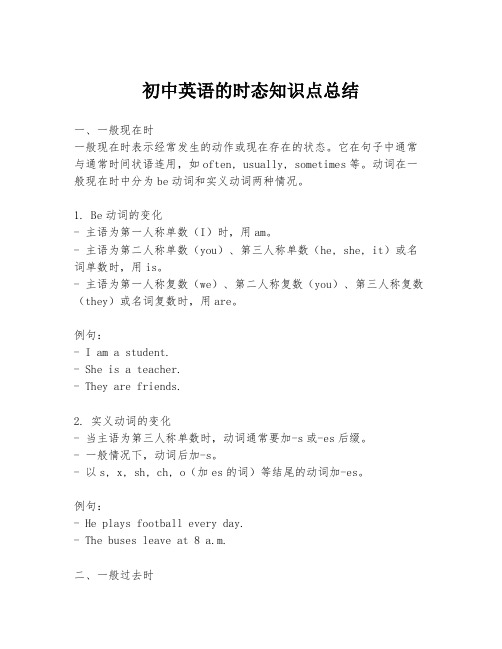
初中英语的时态知识点总结一、一般现在时一般现在时表示经常发生的动作或现在存在的状态。
它在句子中通常与通常时间状语连用,如often, usually, sometimes等。
动词在一般现在时中分为be动词和实义动词两种情况。
1. Be动词的变化- 主语为第一人称单数(I)时,用am。
- 主语为第二人称单数(you)、第三人称单数(he, she, it)或名词单数时,用is。
- 主语为第一人称复数(we)、第二人称复数(you)、第三人称复数(they)或名词复数时,用are。
例句:- I am a student.- She is a teacher.- They are friends.2. 实义动词的变化- 当主语为第三人称单数时,动词通常要加-s或-es后缀。
- 一般情况下,动词后加-s。
- 以s, x, sh, ch, o(加es的词)等结尾的动词加-es。
例句:- He plays football every day.- The buses leave at 8 a.m.二、一般过去时一般过去时表示过去某一确定时间发生的动作或存在的状态。
动词在一般过去时中要变为过去式,一般在词尾加-ed。
1. 规则变化- 动词词尾加-ed(如:played, visited)。
- 以e结尾的动词加-d(如:lived, danced)。
- 以辅音字母+y结尾的动词,变y为i再加-ed(如:studied, copied)。
2. 不规则变化不规则动词的过去式变化没有固定规则,需要特别记忆。
例如:- go去了went。
- eat吃了ate。
- begin开始began。
三、一般将来时一般将来时表示将来某一时间会发生的动作或状态。
它的构成主要有以下几种方式。
1. 将will或shall加在动词原形之前。
- I will go to school tomorrow.- He shall finish the work.2. 用“be going to + 动词原形”表示计划或打算做的事情。
九年级英语时态知识点总结

九年级英语时态知识点总结1. 一般现在时一般现在时表示经常性的行为、习惯、真理和客观事实,以及一般化的观点。
其结构为:主语 + 动词原形(第三人称单数动词加-s)例句:- She goes to school by bus every day.(她每天坐公交车去学校。
)- Cats like to play with balls.(猫喜欢玩球。
)2. 现在进行时现在进行时表示现在正在进行的动作,以及计划、安排的未来动作。
其结构为:主语 + am/is/are + 现在分词例句:- They are watching a movie now.(他们现在正在看电影。
)- She is meeting her friends tomorrow.(她明天将要和她的朋友们见面。
)3. 一般过去时一般过去时表示过去发生的动作或状态。
其结构为:主语 + 动词过去式例句:- We went to the beach last summer.(我们去年夏天去了海滩。
)- He studied hard for the test.(他为了考试努力学习。
)4. 过去进行时过去进行时表示过去某个时间段正在进行的动作。
其结构为:主语 + was/were + 现在分词例句:- They were playing soccer when it started raining.(下雨时他们正在踢足球。
)- I was studying in the library yesterday afternoon.(昨天下午我在图书馆学习。
)5. 一般将来时一般将来时表示将来某个时间要发生的动作。
其结构为:主语+ will + 动词原形例句:- We will have a party next week.(我们下周要开派对。
)- She will visit her grandparents this weekend.(她这个周末要去看望她的祖父母。
复习专题动词的时态-知识点归纳与练习

复习专题动词的时态-知识点归纳与练习一、初中英语动词的时态1.Jack ______ a shower when his mother rang him up.A.takesB.has takenC.is takingD.was taking【答案】D【解析】句意:当他妈妈给他打电话的时候杰克正在洗澡。
本句考查过去进行时态。
“他妈妈打电话”是过去的时间,在过去某个时间正在进行的动作,使用过去进行时,故选D。
2.She ________on the phone,so I just smiled at her and went away.A.has talked B.was talking C.will talk D.is talking【答案】B【解析】【详解】句意:她正在打电话,所以我只是朝她笑笑就走了。
考查动词时态辨析。
so所以,表结果;根据so I just smiled at her and went away,可知她正在打电话,需用过去进行时,故选B。
3.--- I went to see you last night, but you weren’t in. Wh ere were you then?---I _______ a walk by the river.A.had B.was having C.have had D.have【答案】B【解析】【详解】句意:——昨晚我去看你了,但你不在。
那时你在哪里?——我在河边散步。
由上文中“Where were you then?”可知,问句是询问“昨天晚上当我去看望你的时候,你正在哪里?”此句表达的是过去正在发生的事情,要用过去进行时态。
故答案为B。
4.— Who the classroom tomorrow, Tony?— Our group.A.will clean B.cleans C.cleaned D.clear【答案】A【解析】句意:——托尼,明天谁打扫教室?——我们小组。
初中英语语法:动词时态讲解及练习
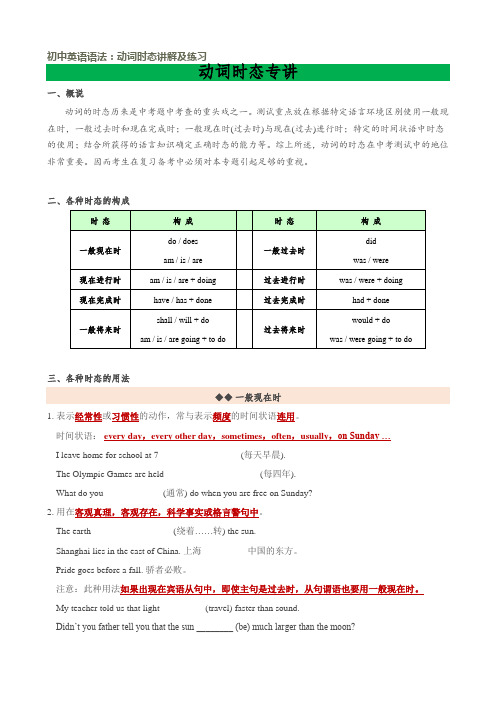
初中英语语法:动词时态讲解及练习动词时态专讲一、概说动词的时态历来是中考题中考查的重头戏之一。
测试重点放在根据特定语言环境区别使用一般现在时,一般过去时和现在完成时;一般现在时(过去时)与现在(过去)进行时;特定的时间状语中时态的使用;结合所获得的语言知识确定正确时态的能力等。
综上所述,动词的时态在中考测试中的地位非常重要。
因而考生在复习备考中必须对本专题引起足够的重视。
二、各种时态的构成三、各种时态的用法◆◆一般现在时1. 表示经常性或习惯性的动作,常与表示频度的时间状语连用。
时间状语:every day,every other day,sometimes,often,usually,on Sunday …I leave home for school at 7 _________________ (每天早晨).The Olympic Games are held ____________________ (每四年).What do you ____________ (通常) do when you are free on Sunday?2. 用在客观真理,客观存在,科学事实或格言警句中。
The earth _________________ (绕着……转) the sun.Shanghai lies in the east of China. 上海__________中国的东方。
Pride goes before a fall. 骄者必败。
注意:此种用法如果出现在宾语从句中,即使主句是过去时,从句谓语也要用一般现在时。
My teacher told us that light _________ (travel) faster than sound.Didn’t you father tell you that the sun ________ (be) much larger than the moon?3. 表示按计划表或时间表将要发生的动作,某些动词如come, go, move, stop, leave, finish, start等,在一般现在时态中可用来表示将来肯定会发生的动作。
(完整版)四种时态及其练习(完整版)
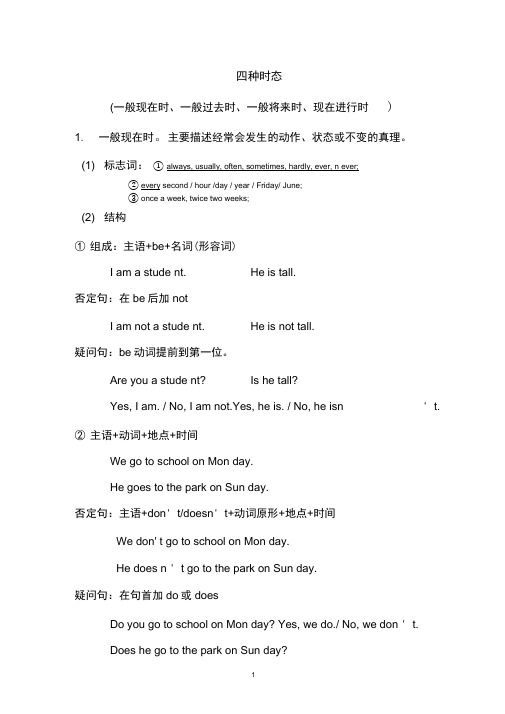
四种时态(一般现在时、一般过去时、一般将来时、现在进行时)1. 一般现在时。
主要描述经常会发生的动作、状态或不变的真理。
(1) 标志词:① always, usually, often, sometimes, hardly, ever, n ever;②every second / hour /day / year / Friday/ June;③once a week, twice two weeks;(2) 结构①组成:主语+be+名词(形容词)I am a stude nt. He is tall.否定句:在be后加notI am not a stude nt. He is not tall.疑问句:be动词提前到第一位。
Are you a stude nt? Is he tall?Yes, I am. / No, I am not.Yes, he is. / No, he isn ' t.②主语+动词+地点+时间We go to school on Mon day.He goes to the park on Sun day.否定句:主语+don' t/doesn' t+动词原形+地点+时间We don' t go to school on Mon day.He does n ' t go to the park on Sun day.疑问句:在句首加do或doesDo you go to school on Mon day? Yes, we do./ No, we don ' t.Does he go to the park on Sun day?Yes, he does./ No, he does n (3) 动词三单变化:① 在原单词末尾加s ,如:like - likes② 单词以 o, sh, ch, s, x 结尾力口 es,女口: go - goes ③ 单词末尾为辅音+y 结尾去y 加ies 女口: study- studies 2.现在进行时:主要叙述正在发生的事情。
初中英语五个时态专题练习和答案(复习可用)
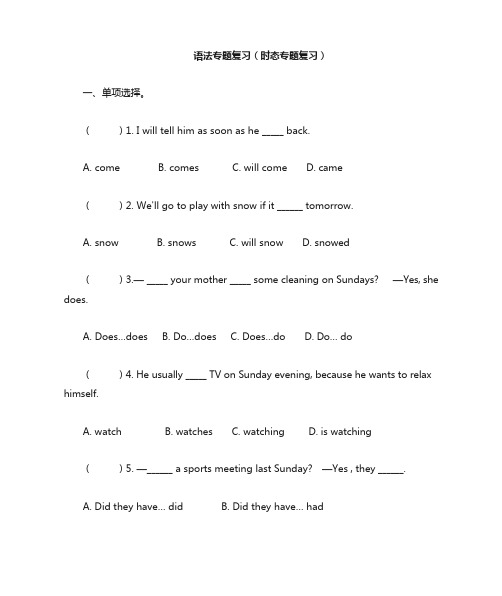
A. snow
B. snows
C. will snow D. snowed
( does.
)3.— _____ your mother _____ some cleaning on Sundays? —Yes, she
A. Does…does B. Do…does C. Does…do D. Do… do
( )11. You _____ me waiting for two hours. I _____ for you since five.
A. kept…waited
B. have kept…waited
C. kept…have waited D. have kept…have waited
( )12. —Where _____John _____?
6. We_________ (have) a good time in the Summer Palace last Sunday.
7. If it _________________ (not rain) tomorrow, we'll have a football match.
8. Don't forget _____________ (close) the window when you leave the room.
A. got to
B. reached C. arrive in D. reach
( )10. She ______ to school yesterday because of the strong wind and heavy rain.
A. goes B. went C. doesn’t go D. didn’t go
- 1、下载文档前请自行甄别文档内容的完整性,平台不提供额外的编辑、内容补充、找答案等附加服务。
- 2、"仅部分预览"的文档,不可在线预览部分如存在完整性等问题,可反馈申请退款(可完整预览的文档不适用该条件!)。
- 3、如文档侵犯您的权益,请联系客服反馈,我们会尽快为您处理(人工客服工作时间:9:00-18:30)。
时态练习一般现在时一.写出下列动词三单形式wash watch finish guess snow take carry study have dogo cry dance read__ washlook brush sing swim二.替换练习(把句中的I 替换成She)I like apples.I eat bananas.I need a book.I play soccer.I call Mary.I ask teacher.Do you have a penI go to school.三用括号内动词的正确形式填空:1. Daniel and Tommy (be) in Class one.2. We (not watch)TV on Mondays.3. Nick (not go)to the zoo on Sundays.4. they (like) the World Cup5 .He often (have) dinner at home.6 .What they often (do) on Saturdays7. ___your parents___(read) newspapers every day8. The girl (teach) us English on Sundays.9. She (not do) homework every day.10. There (be) some water in the bottle.11. Mike (like) cooking..12. She (go) to school from Monday to Friday.13. Liu Tao (not) like PE.四. 用have 或has 填空。
1.I ___ three friends in England.2. They_____ a big room.3. Helen ____ two cats.4. Jack and Cindy _____ a son.5. She ____ a big apple.6. Do you____ a bag7. Bob’s brother ___a nice watch.五. 用like填空,并改为一般疑问句,再肯定/否定回答1. I pears very much.2. They_____ their school.3. Helen vegetables.4. Jack and Cindy bread.5. She hamburgers.’s brother carrots and rice.7. Our teacher reading.六. 用like填空,并改为否定句。
1. I pears very much.2. They their school.3. Helen ____ vegetables.4. Jack and Cindy bread.5. She hamburgers.’s brother _carrots and rice.7. Our teacher reading.七.判断句1. Tom plays football everyday. ()2. Tom doesn’t plays football everyday. ()3. Our school start at 7:00. ()4. Mary doesn’t like football. ()5. Lily and Tom’s mother go to work everyday. ()6. Does their father likes running. ()一般过去时一、判断并改错题:1. Tom played football yesterday.2. Tom didn’t plays football everyday.3. Mary not liked football.4. Mary didn’t like football.5. He wents to school yesterday.6. He went to school yesterday.7. I not did homework last night.8. I didn’t do homework last night.9. Where you went just now10. Where did you go just now二、用括号内动词正确形式填空:1. I (have) an exciting party last weekend.2. she (practice) her guitar yesterdayNo, she .3. —What Tom (do) on Saturday evening—He (watch) TV and (read) an interesting book.all (go) to the mountains yesterday morning.5. She (not visit) her aunt last weekend.现在进行时一、将下面的词改为现在分词:walk go cook fly climbread shave give shine type make take sit run shut read paint drink eat smileride swim wave put shop二、练习1. They (play) basketball now.2. you (do) homework now.3. Look! The dog (run) after a cat.4. My mother (watch)TV now.5. Lily (sing) a song now.三、判断正误My father repairing the roof now. ( )My father is repairing the roof now. ( )Look! A cat climbs a tree. ( )Look! A cat is climbing a tree. ( )She is always interfering in my affairs. ( )四、单选题1.Look, the dog _________ after the cat.A. is runningB. is runingC. running2.My school bag is __________ the tree.A. overB. onC. under3.Susan is _________ under the tree, but John is_________ the tree.A. siting; climbingB. sitting; climbingC. sitting; climbing 4.—What __________ your brother _________—He is making the bed.A. is; doingB. do; doC. are; doing5.What _________ he doingA. doesB. isC. are五.按要求改写句子1. The boy is playing basketball.否定句:____________________________一般疑问句:________________________肯定回答:__________________________否定回答:__________________________对“is playing basketball”提问:__________________________对“ The boy”提问:__________________________2. They are singing in the classroom.否定句:__________________________ __一般疑问句:_________________________肯定回答:__________________________否定回答:__________________________对“are singing ”提问:__________________________对“ in the classroom”提问:__________________________六、请将下列句子改为一般疑问句1. Like is climbing the hill.__________________________________________2. We are having an English lesson now.__________________________________________3. Li Ping is jumping like a monkey.__________________________________________4. The students are reading the text now.__________________________________________5. I am studying English.__________________________________________一般将来时一、题目大练兵1.wait for a bus / I_____________________2.do one's homework / she_____________________3.listen to the stereo / he_____________________4.wash the dishes / my mum_____________________5.send a card / Miss Li_____________________二、选择题( ) 1.There ________ a dolphin show in the zoo tomorrow evening.A.was B.is C.is going to be ( ) 2.Don’t ___________ it!A. dropB. dropsC. to drop( ) 3.Don’t __________ it here.A.to put B.put C.putting( ) 4.What __________ show to your classmateA.are you going to B.are you C.you are going to( ) 5.The bike is _________ front of the car. Can you find itA.in B.on C.at( ) 6.– Give me the picture, please.–__________ oneA.Where B.What C.Which( ) 7.Don't __________ the radio. Tom is sleeping.A.put on B.turn on C.turn off( ) 8.There __________ a meeting tomorrow afternoon.A.will be going to B.will going to be C.is going to be( ) 9.Is there _________ sugar in the bowlA.a B.some C.Any( ) 10.There is _________ spoon on the desk.A.a B.some C.any( ) 11.-- What are you going to do-- We are______.A.paint B.going to paintingC.going to paint D.painting( ) 12.We are going to______our homework.A.does B.to do C.doing D.do三、选择题( )1. There a meeting tomorrow afternoon.be going to going to be C. is going to be go to be( )2. Charlie here next month.’t working B. doesn’t workingC. is n’t going to working ’t wor( )3. He very busy this week,he free next week.be; is B. is; is be; will be ; will be( )4. There a dolphin show in the zoo tomorrow evening.B. is going to have have going to be( )5. —you free tomorrow— No,I free the day after tomorrow.A. Are; going to ; willB. Are; going to be ; willC. Are; going to ;will beD. Are; going to be ;will be( ) 6. Mother me a nice present on my next birthday.A. will givesB. will giveC. givesD. give( ) 7. –Shall I buy a cup of tea for you-- .A. No, you won’tB. No,you aren’t .C. No, please don’t.D. No,please .( ) 8. —Where is the morning paper—I it for you at once.A. getB. am gettingC. to getD. will get( ) 9. a concert next SaturdayA. There will beB. Will there beC. There can beD. There are( ) 10. If they come ,we a meeting.A. haveB. will haveC. hadD. would have。
